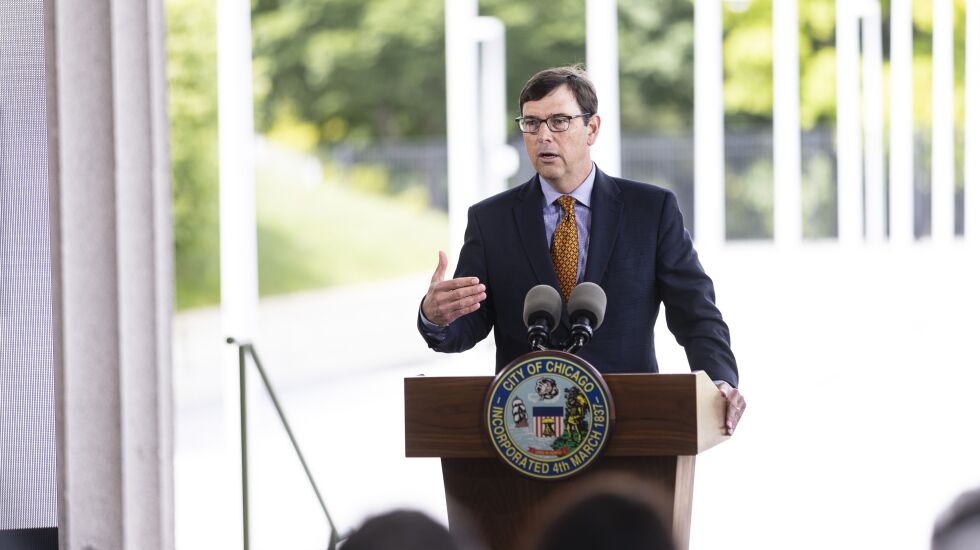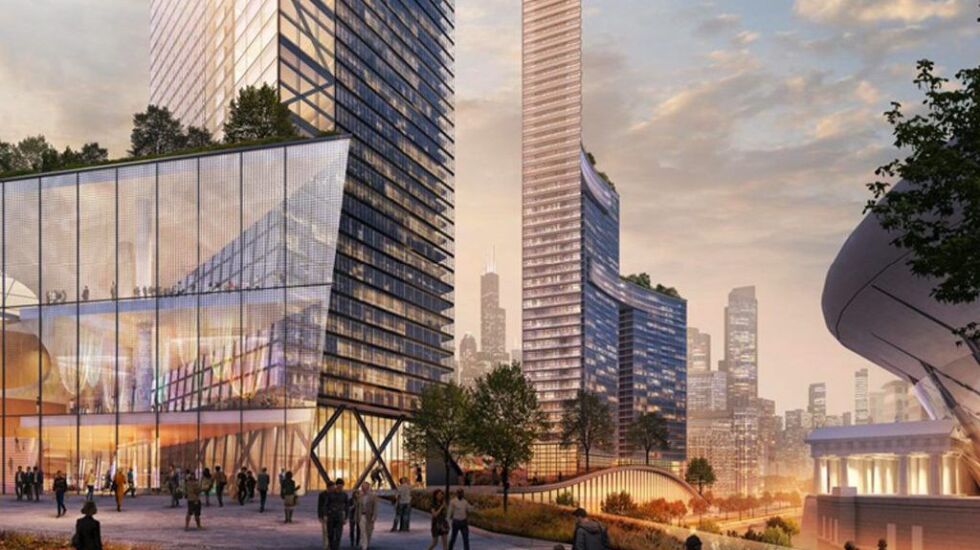Mayor Lori Lightfoot, in showing her elaborate vision for keeping the Chicago Bears in town, introduced Monday possibly the most valuable player on her team for improving Soldier Field.
He’s Bob Dunn, a real-estate developer uniquely suited for the job. He has a vested interest in keeping Soldier Field viable because he wants to build a $20 billion high-rise community next to it, with a transit hub to serve the future throngs.
But as president of Landmark Development, Dunn also has massive experience with building NFL stadiums. He’s been part of the group behind new homes for every Bears rival in the NFC North, as well as MetLife Stadium in New Jersey, where the New York Giants and Jets play.
During her Soldier Field announcement, Lightfoot yielded the podium to Dunn to speak for 15 minutes about the possibilities for doming Soldier Field and expanding its capacity to make it among the best venues in the NFL. His company produced the renderings Lightfoot relied on to show the possibilities.
Dunn took on naysayers, including architects and engineers, who have said Soldier Field cannot be domed at a reasonable cost. He said his approach would use “four super-columns” to support a dome over the existing structure. Dunn called the technique a hybrid of designs employed for Ford Field in Detroit, home of the Lions, and the Vikings’ U.S. Bank Stadium in Minneapolis.
“Working inside the confines of this building as we know it today, Soldier Field can transform to become a dome,” Dunn said. The result, he said, would be a “Chicago-centric” attraction, appealing to fans and the NFL’s TV audience, and not a look-alike stadium.
“Real value is when you create a distinctive asset of a unique character,” he said. That marked his direct pitch to Lightfoot’s most important audience Monday, the Bears franchise.
The team has signed a contract to purchase the former Arlington International Racecourse in Arlington Heights and is exploring options there, but there is no commitment to move.
Dunn said land is available to add amenities to Soldier Field, such as expanded seating and more space for food, beverage and retail sales. It adds up to more revenue and an increase in the value of the Bears franchise over time, he said. Forbes has estimated the team is worth $4 billion.

Relying on estimates from Dunn’s firm, Lightfoot said the dome could be added for up $2.2 billion. While funding options were not discussed in detail, Dunn said refurbishing Soldier Field would be “substantially less expensive” than a new stadium in Arlington Heights.
The $2.2 billion estimate is in line with what some recent NFL stadiums have cost, although inflation and rising interest rates have hit the construction sector hard since those projects were finished.
A spokesman for Dunn said he was not paid for helping the city with Soldier Field. Dunn was not available for a one-on-one interview.
His involvement with the stadium is not an act of charity. Whether for football, Chicago Fire soccer games or other events, he needs people to keep coming to Soldier Field. It would help build the case for a state-subsidized transit hub crucial to his One Central development, which would cover about 32 acres, mostly on a platform over the Metra Electric rail lines.
The project, calling for 9,000 residences, has drawn cool reactions from Lightfoot, potential neighbors and Gov. J.B. Pritzker. The governor backed legislation authorizing the state to join a partnership with Dunn but has balked at going forward.
Asked Monday if her feelings about One Central have softened, Lightfoot again thanked Dunn for his Soldier Field work but said: “I don’t want to get ahead” of a state feasibility study assessing prospects for One Central.








